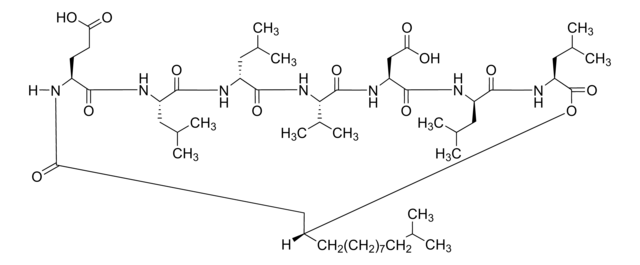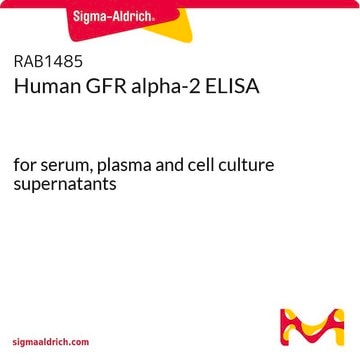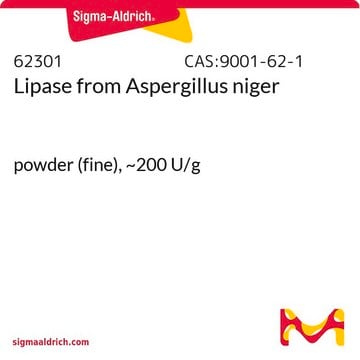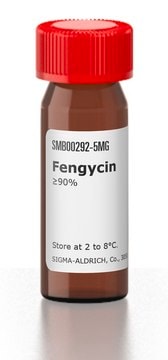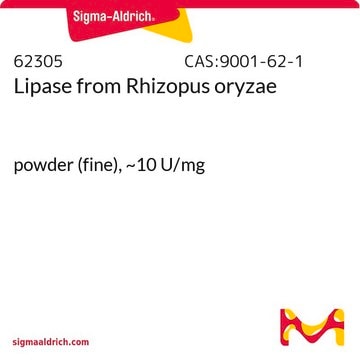Recommended Products
Quality Level
Assay
≥98% (SDS-GE)
form
solid
UniProt accession no.
storage temp.
−20°C
Gene Information
Schizophyllum commune H4-8 ... SC3(9592530)
General description
Hydrophobin SC3 is a class I hydrophobin of Schizophyllum commune. It is an oligomeric amphiphilic protein, rich in β-sheet. The mature protein consists of four disulfide bridges comprising eight cysteine residues. The N-terminal contains mannose residues in combination with threonine residues.
Application
Hydrophobin SC3 has been used to coat nitric oxide (NO) releasing medical-grade polymer to establish an antifouling layer to work synergistically with NO′s bactericidal and antiplatelet activity (SC3-NO).
Biochem/physiol Actions
Hydrophobins are key regulators of fungal growth and development. The hydrophobin SC3 is known for its ability to assemble at the water and air, water and oil, and water and a hydrophobic solid interface. The self-assembling process subjects hydrophobin SC3 to many conformational changes. It permits the growth of aerial hyphae and fruiting bodies on fungi as a result of assembling at the water-air interface. Hydrophobin SC3 mediates the linking of cell wall glucans to chitin and helps in the hyphal cell wall formation. Hydrophobin SC3 might have antitumor actions and be useful in chemotherapy and radiation.
Other Notes
Currently available only in Europe.
Storage Class Code
11 - Combustible Solids
WGK
WGK 1
Flash Point(F)
Not applicable
Flash Point(C)
Not applicable
Personal Protective Equipment
dust mask type N95 (US), Eyeshields, Gloves
Choose from one of the most recent versions:
Already Own This Product?
Find documentation for the products that you have recently purchased in the Document Library.
X Wang et al.
Biophysical journal, 88(5), 3434-3443 (2005-03-08)
Hydrophobins are a class of small proteins that fulfill a wide spectrum of functions in fungal growth and development. They do so by self-assembling into an amphipathic membrane at hydrophilic-hydrophobic interfaces. The SC3 hydrophobin of Schizophyllum commune is the best-studied
Marijke Haas Jimoh Akanbi et al.
Applied microbiology and biotechnology, 97(10), 4385-4392 (2012-08-01)
The use of mushroom extracts has been common practice in traditional medicine for centuries, including the treatment of cancer. Proteins called hydrophobins are very abundant in mushrooms. Here, it was examined whether they have antitumor activity. Hydrophobin SC3 of Schizophyllum
Paul J Molino et al.
ACS nano, 12(11), 11610-11624 (2018-10-20)
Hydrophilic surface chemistries can strongly bind water to produce surfaces that are highly resistant to protein adsorption and fouling. The interfacial bound water and its distinct properties have intrigued researchers for decades, yet the relationship between the water three-dimensional structure
Ryan Devine et al.
Biomaterials science, 7(8), 3438-3449 (2019-07-04)
In medical device design, there is a vital need for a coating that promotes treatment of the patient and simultaneously prevents fouling by biomacromolecules which in turn can progress to infections, thrombosis, and other device-related complications. In this work, hydrophobin
Eva Sahakian et al.
Journal of leukocyte biology, 102(2), 475-486 (2017-05-28)
Epigenetic changes in chromatin structure have been recently associated with the deregulated expression of critical genes in normal and malignant processes. HDAC11, the newest member of the HDAC family of enzymes, functions as a negative regulator of IL-10 expression in
Our team of scientists has experience in all areas of research including Life Science, Material Science, Chemical Synthesis, Chromatography, Analytical and many others.
Contact Technical Service